
 |
Landmines A very fine weapon. |
 |
Violence More sex, less violence. |
 |
Politically correct ?? |
 |
Consumerism Are we just consumers? |
 |
Spiritual Or supersitious? |
 |
Trade Life or NYSE ? |
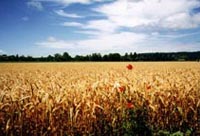 |
Garbage Do you care ? |
 |
Food What do you eat ? |
 |
Journalists Or blood-thirsty? |
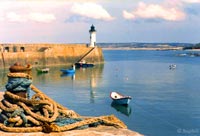 |
Silence Or free-of-charge noise? |
 |
Drinking water Tap or bottled water? (separate page) |
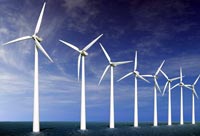 |
Energy Renewable? (separate page) |
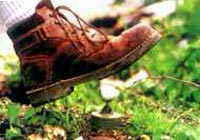
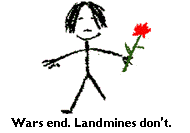


A landmine is cheap to produce, and expensive and time-consuming to remove once it has been placed in the field. As long as it is not removed, it kills. 30 years after the war is over. France has 1.4 million of such mines in its arsenals (is that by fear of a Belgian invasion?). It has now committed to destroy them within two years. Will China, India, Pakistan and the U.S. ever follow?
Governments tend today to be more sensitive to the pressure of the public opinion. Your opinion counts. For a better information, goto the American site supporting the ban of landmines.


(*) See F. Héritier and P. Karli in "Science et Vie", N°1031, Aug 2003, p.43.

Aimé Césaire

Vaclav Havel
Speaking of politics — but this is actually a different subject — I recommend you to read the opinion of Vaclav Havel.
See also my reactions about authenticity.
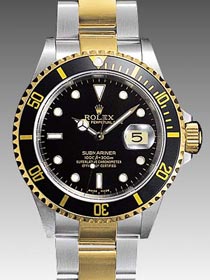
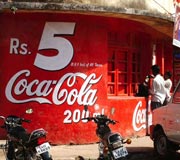
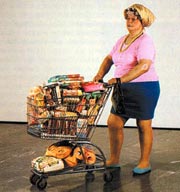
Obviously, fashion is not something new: Molière already denounced it (1659) in Les Précieuses ridicules. Today, ten year old children fume against their parents if they are refused sports shoes with a bright Nike or Reebok logo.
Coca-Cola is sold in Goa (photo taken in 2003). The company already advertised this beverage in 1900. Advertising (disguised as "communication" by those ashamed of speaking openly of advertising) tries to make us buy all sorts of products that we do not really need — and often succeeds. And this is how, going to the supermarket to buy a box of washing powder and a tube of tooth paste, you come back home with a load of sweets and a miracle can-opener that will soon find its last residence at the back of the kitchen drawer.
I consider myself a citizen, not a consumer. Clearly, if I really have to buy something, I wish to find information helping me chose among a vast offering. I am thus not totally opposed to advertising. But I vehemently combat magical claims about the health benefits of industrial food, "rich in omega three and calcium". See an example in my "Reactions" page. It is mostly a deception.
A few consequences of our consumer frenzy:
The story of stuff: a little simplistic, but basically correct, about the life cycle of products, designed obsolescence, why our society turned human beings into consumers, how it harms the planet and what will be done to avoid a total ecological disaster. Watch the 20 minute video to its end.
Open Food Facts (in my "Reactions" page): the ingredients and additives of all the industrial food products!
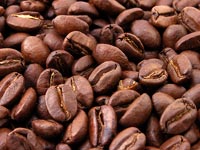
When you pay 3 Euros for a cup of coffee on the Champs-Élysées, the Indonesian, Ugandan or Colombian producer gets less than a cent.
The revenue of the coffee producers dropped from 12.5 G$ (Gigadollars, or billions of US$) down to 5.5 G$ over the last ten years. In the same time span, the turnover of the five biggest coffee traders moved from 30 to 60 G$. In other words, the income of the producers was halved, and that of the traders has doubled.
It does not seem vital to me that the value of the Nestlé common share maintain a high level. On the other hand 500,000 jobs have been lost in 2001, because the market price for coffee beans has collapsed. 25 million rural families (yes, 25,000,000) are suffering a dramatic decrease of their income. This is blatant injustice, and throws a peculiar light on the "global policies" which are developed for the sole benefit of the rich countries. We are creating explosive conditions amidst the peoples who suffer from these policies. The day a revolt appears, you and I will have created a part of it.
We can act, modestly, against this trend, when we buy coffee, chocolate or bananas for which we know a fair price is being paid to their producers.
More information on "Fair Trade" (links).
What I said on this subject in January 2000: A fair price





See also: Reactions (updated regularly)
2008 / 2021

A wheat field
Another subject of concern in 2021: it is estimated that the oceans contain between 100'000 and 500'000 tons of plastic garbage. A big part is fragmented into small particles, the number of which being in the order of 2 × 1019 (20 billions of billions). This plastic has been initially left on beaches and in rivers and ends up in the sea. It gets fragmented , but does not disappear, and the fish eat it. Carried by the wind, plastic particles also end up in the mountains at 4000 m altitude...
Some simple things you can do to to preserve the earth:
2004 - 2021

Our daily sugar intake should be less than 50 g per day, which makes 18 kg per year. In the USA, (source: USNews.com), the per capita sugar consumption was 65 kg per year in 2003... Don't forget that a big part of the sugar you eat comes from transformed food.
My father used to say: the people of Wallis (a mountainous area of Switzerland) used to have excellent teeth until commerce with the bottom of the valley, and thus with the rest of the world, developed, and they had access to sugar. In less than a generation, they all lost their teeth.
I am not saying that their life was all rosy: they suffered other diseases due to malnutrition, especially goiter caused by insufficient iodine in the food and in the salt.
Since the beginning of life, many populations had to struggle everyday to get food. Many still have to. In the so-called "developed world", plentiful food is available to - almost - everybody. But what food? White refined sugar, glucose from starch, wheat flour as white as snow, plus any amount of chicken and beef raised with generous doses of hormones, processed carcasses and antibiotics. Here is a list of the permitted food additives in Europe, with a few comments.
A few years ago, Europe was sitting on a "butter mountain" that seems to have melted since, meaning probably that we have eaten all. This is now our food: sugar, white flour, cheap meat and milk fat. The basic ingredients of a hamburger. When you happen to pass through Los Angeles or Philadelphia airport, you can't help wondering at the number of obese people wandering around.
See also:
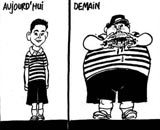
The danger expecting Elian, the Cuban kid, if he stays too long in Miami...
(according to the satirical paper "Le Canard Enchaîné" dated 19 Apr 2000)
Click to enlarge
Have also a look at my reactions, and write me to give your own opinion by clicking the yellow envelope or in my guestbook.